 |
 |
 |
But for the remarkable talents of Don Revie, it's odds on that Leeds
United would have forever remained a mediocre provincial team, meaning
little to anyone, even in its West Yorkshire homeland, where cricket and
rugby league were always more important. In the 1950's, Leeds' ranks included
a genuine superstar in the phenomenal John Charles, but he was an enormous
fish in a tepid little puddle and could make the club nothing more than
the stuff of very minor headlines. Don Revie brought Leeds United to public consciousness in a very unique
way. The reputation they earned was often dubious, but their profile was
undoubtedly extremely high. Away from Elland Road, the lasting memory of Revie is the distasteful
and infamous manner of his departure from the job of England manager,
with one famous detractor demanding that he should be castrated. Don Revie
excited passionate emotions in football people, and in many corners of
the country his name is reviled. However, Revie's legacy at Elland Road is indisputable - the former England
inside-forward dragged a side on the brink of Third Division obscurity
up by its bootstraps to become the most powerful football team in the
country. Round Elland Road way, Don Revie is remembered as a peerless
Messiah, and there are few who will hear a word against him. In an era when British football could boast some of its most famous and
charismatic managerial characters - Busby, Shankly, Clough, Allison, Mercer,
Ramsey, Stein, Nicholson - one manager and his team stood out from the
rest, despite never enjoying the success their consistency and supremacy
merited or the genuine affection Revie coveted. Don Revie enjoyed memorable, yet ultimately disappointing, careers as
footballer and manager. He earned respect and success, but any praise
was grudgingly given. As a player, Revie was one of the most intelligent and gifted of post
war inside-forwards, never particularly robust or powerful, but incisive
and accurate, with a vision which allowed him to control the flow of games.
He earned the respect of good football judges and graced the English game
in the 1950's with his shrewd positional play, touch and eye for an opening. He was one in a lengthy tradition of ball playing schemers who graced
the British game before hard running, defensive midfielders overtook them
in the eyes of managers for whom avoiding defeat was the priority. The
likes of Charlie Buchan, Clem Stephenson, Alex James, David Jack (all
stars under former Leeds City boss Herbert Chapman),
Raich Carter, Johnny Haynes and Len Shackleton
were the most treasured of footballers, men who could transform a game
with one sure-footed intervention. Revie himself was one of the most pragmatic of the new breed of manager,
but he still chose to build his later Leeds sides around the genius of
diminutive playmakers Billy Bremner and Johnny Giles after losing the
aggressive bite of Bobby Collins. Revie would have been rendered an irrelevance if he had come up against
Collins on a football field, for he was never the combative type. But
he had a deftness of touch and clarity of vision, and, when deployed in
a team sympathetic to his qualities, he could be a match winner. He had a fascination from his earliest days with tactics and revolutionary
thinking and was as delighted as any Englishman could permit himself to
be when the innovation of the Hungarian national team in the early Fifties
ripped apart an outdated and outwitted England formation. He benefited as a player from studying role models and learned at the
feet of willing mentors after developing skills and techniques in the
back streets of his native North East with a ball made from rags, as the
romantics would have you believe. He caught the eye with stylish displays for Leicester City and Hull City,
before blossoming with Manchester City and breaking through into the full
England side in 1954 after years as a nearly man. It was a tragedy that Revie won only six England Revie lost his way as a footballer after that triumph, winning his sixth
and final England cap in October 1956 and shuffling sideways offstage
with Sunderland and then humble Leeds United before finally retiring from
playing in 1963. For a time he had combined playing with managing, but
his final onfield contribution was in March 1962 as Leeds battled to avoid
relegation to the Third Division. Opinion is divided about Don Revie the player, with many commenting on
a surprising inflexibility, and a need for the rest of the team to play
his way. Sunderland inside-right Charlie Fleming played alongside Revie
in his latter days and is a critic: 'The trouble is, there was only one
way Don could play but there were ten other players on the field. We had
to start off trying to get him into the game. He did a lot of things foreign
to us and we could have frozen him out ... For instance, Don would centre
the ball and then disappear. He was always caught behind. I found that
Don's system was alright in Manchester but everybody knew about it when
he came to Sunderland, and how to play against it. Don couldn't change
himself.' Others from his Roker days were more generous. Half-back George Aitken:
'He was a great player ... he was forever trying to make the rest of the
team play. Don took the game very seriously ... and he would try to help
people and give a bit of advice.' Billy Simmons, life-long Sunderland
supporter and club historian, was similarly positive: 'He played plain,
clean football and could find holes in defences. The reason why he was
not a success at Roker was that the players could not keep up with his
football brain.' Raich Carter signed Revie for Hull City as his replacement, but was unimpressed
by his contributions at the Yorkshire club: 'I think he let me down. I
was expecting too much too soon. Revie didn't play as well as I thought
he would ... I always thought he was an inside-forward but he didn't have
the punch an inside-forward should.' But the Silver Fox acknowledged,
'You have late developers. When he left here, he went to Manchester City
where he blossomed,' admitting that it was only Revie's lack of aggression
that let him down. Revie won new admirers after his move to Elland Road. His favourite son
at the club, Billy Bremner: 'What impressed me more than anything else
was his vision on a football park ... it was tremendous. And after he
had struck the ball, he would pose, as if for a photograph.' Jack Charlton is direct in his summing up: 'Good striker of the ball,
good passer, was Don - though he couldn't tackle to save his life.' Renowned as he was as a player, however, it was when Don Revie hung up
his boots and concentrated on management that he achieved his greatest
fame - and notoriety. Given his break in March 1961 by a Leeds United board in desperate straits,
he first stabilised a drifting club, then fashioned a revolution that
made his team among the most feared and powerful in Europe. Their early
success was built on niggling gamesmanship and hard tackling ferocity,
but they later perfected a style of flowing football which carried all
before it in the early 1970's, culminating in a memorable League title
and the prize of the England manager's job. The reputation that 'Dirty Leeds' won in Revie's first four or five years
at Elland Road stayed with the man for years, tarnishing his name. The
more venomous of his critics seized on his insecurity and pursuit of material
wealth to characterise him as 'Don Readies' when he jumped ship before
the Football Association could knife him in the back. Gossip and innuendo followed Revie throughout his managerial career,
and he despaired that his achievements in club management were never celebrated
as they should have been. But for Leeds United followers the memory of
Don Revie will always be accorded the greatest respect. He single-handedly changed the standing of the football club and built
what It did not take long for all that Revie had built to erode and a lengthy
slump ended with Leeds United consigned to the Second Division, just seven
years after they had reached the European Cup final. That demise cut Revie
to the quick, but only added lustre to the memory of his achievements
at Elland Road. He was the soundest of man managers, although his homespun philosophies
and homilies worked less well with proven international players when he
took the England job. He missed the family atmosphere he had built up
at Leeds, and suffered from not being seen as omnipotent by his new charges. Mike Channon played more games for England under Revie's management than
anybody else: 'He wanted the England team to be his boys, like at Leeds.
He would go, "Come on, lads, we're having bowls tonight," on
a Friday night. But we were England! I think he was unfortunate to get
it wrong. And I think once he fell out with someone, he couldn't forgive.
Of course we used to sneak out. I used to rebel against being told what
do. You treat people like children and they behave like them.' In contrast, most of the players who grew up with Revie at Leeds were
unswerving in their devotion to the man. They recognised his faults, but
acknowledged that he was the biggest influence on their careers. Eddie Gray: 'He had tremendous physical presence and personality. He
told my father, "I know you don't know much about Leeds United now,
but in the not too distant future, this club is going to be one of the
best in Britain." He was not the only manager who sang that type
of tune, but his enthusiasm and drive were such that it was difficult
to dismiss his claims. His persuasiveness was underlined even more forcibly
by our belief in his assertion that Leeds could become the English equivalent
of Real Madrid. 'While he was not as volatile as Sir Alex Ferguson, Don had a similarly
intimidating aura. Norman Hunter, recalling the first and only time he
was late for training, says, "All Don did was to walk a couple of
yards towards me and look at his watch - that really was all he did, and
all he needed to do to make me feel bad about it." 'He had a very strong character and when he was angry about something,
we were liable to be quite sensitive about doing or saying anything which
might make the situation worse. He was a big man with big hands. I remember
the hands because when he brought his fist down on a table - something
that he often did when upset - the whole room seemed to reverberate. If
we had not played well, the other warning signal for us was his habit
of storming into the dressing room after the match, briefly combing his
hair in the mirror and then going out again without saying a word. At
times like that, the dressing room suddenly became quiet enough for you
to hear a pin drop. 'In team talks, when addressing players who had displeased him, he had
a habit of muttering, "I'm going to need to get the chequebook out"
- meaning, of course, that if they could not do what he wanted, he would
buy players who could. Despite the number of times he said it, occasionally
in circumstances that made the remark seem farcical, it never totally
lost its effect. 'He wasn't just a manager to me. I went to Leeds United as a 15-year-old
and more or less grew up with him. He brought me along in life and was
more like a father than a manager.' Jack Charlton: 'Don Revie made Leeds United into one of the most professionally
run clubs in Europe. If I had to sum up Don's Trevor Cherry: 'He treated me like a son. I owe a great deal of what
I've got now and what I have achieved to Don.' Joe Jordan: 'He is the best manager I have been privileged to work under.' Billy Bremner: 'He was never a tough disciplinarian despite his outward
image. If you stepped out of line you knew you were for the chopping block,
but he never had to rant and rave. He commanded respect because he gave
respect and treated his players as men. Though we were allowed to dress
in casual clothes for travelling away, we always had to remember that
we were representing the club and had to be presentable. We were not allowed
to have very long hair. We didn't have to look like convicts but we were
expected to look neat. 'He was always very superstitious and would often wear the same suit
game after game while we were winning. His favourite was a blue one. I
was a bit superstitious for a while, like most players. I used to do things
like borrow Norman Hunter's comb, putting my pants on last and things
like that. I was cured when we were narrowly pipped for three major trophies
in one season. I realised then that it was not worth all the trouble -
what will be will be. 'Superstitious or not, Don Revie was nobody's fool. He made Leeds United
great again and after he had left things began to decline. When he went
to the England job he did not have a great success as he had done at Elland
Road - mostly I think because he did not have the daily contact with players
and therefore could not develop that family spirit which worked so well
at Leeds. For my money, Don Revie was one of the greatest managers of
all time and he certainly played a key part in my career. When he was
awarded the OBE in January 1970, nobody was more pleased than me. It was
an honour he thoroughly deserved.' Peter Lorimer: 'Every season there were new rumours about him leaving
Leeds to join this club or that, and it has always been my feeling that
this was just to put extra pressure on Leeds to increase his wage packet.
Don always said that he was going to retire in his early fifties and enjoy
life, and this of course required the amassing of money. He also knew
how to use the press. If he thought it would do him any good he would
not be averse to stories that he was wanted elsewhere, thereby raising
his stock at Leeds United. Conversely, if anybody wrote in derogatory
terms about his team he would tell the paper responsible not to bother
sending its representative to the next game because he would not 'He was a manoeuvrer, manipulator and planner. He was also the worst
loser on the planet. I have never known a man take defeat so badly, so
personally, and this was a weakness of his.' Referees often fell foul of Revie and pressure from his team. Andrew
Mourant in his biography of Revie: 'Clive Thomas has said that with its
relentless harassment and contesting of decisions on the field, Don Revie's
Leeds United gave him more trouble than the other First Division clubs
put together. Yet Jack Taylor says: "Revie was personally charming.
I have all the time in the world for him. He was never anything other
than honest and frank."' Some other personalities in the game openly despised Revie, with possibly
the deepest enmity being expressed by Bob Stokoe, who revelled in the
FA Cup triumph of his humble Sunderland side over Revie's Leeds in 1973.
He always maintained that Revie tried to bribe his Bury team before a
relegation tussle in 1962, and is outspoken in his criticism: 'It has
always riled me when I see the career Revie has had. At the back of my
mind, the bribe is always there. He was always an evil man to me.' Stokoe's bitterness was more extreme than that of anyone else, although
Revie's abandonment of the England job provoked intense personal attacks
and hysterical over reactions. For a long time the episode threatened
to distort the memory of the good work Revie had done over the years.
But time is a great healer, and many of the wounds have scabbed over if
they have not completely healed. The most sustained monuments to the man are his Revie Plan-inspired FA
Cup triumph with Manchester City and the memory of a Leeds United side
that dominated the English game in the Sixties and Seventies. Under his management, Leeds won all three major domestic honours and
were one of the most powerful teams in Europe. Between 1965 and 1974 they
never finished out of the top four in Division One and were the most feared
side in the country. The greatest testament to his influence on the club
was the fact that, prior to his reign at Elland Road, the only major trophy
they had won was the Second Division title. In later years, Howard Wilkinson
inspired a revival but it came nowhere near emulating the achievements
of Revie. But there will always remain the depressing and lasting impression of
Leeds United as eternal chokers, consistently blowing their chances in
disastrous end of season collapses. They were runners-up in the championship
on five separate occasions, and an additional thirteen points at the right
time would have brought them five titles to add to the two they actually
won under Revie. They were beaten finalists in Cup competitions on five
occasions and fell at the semi-final hurdle too many times to contemplate. Despite all the heartbreaks and setbacks, however, Don Revie and Leeds
United always contrived to come back, stronger and more determined at
the start of the following season, when they would inevitably emerge once
more as the team to beat. Johnny Giles: 'People didn't give us enough credit for picking it up.
After what we had been through, a lot of clubs, a lot of players would
have collapsed. But there were never any public recriminations. Everyone
kept quiet and we said we'd start again next year. We knew we were the
best team in the country.' Syd Owen: 'We would just tell the players that they had done themselves
justice.' Billy Bremner notes that some of the never-say-die attitude which was
exhibited by his colleagues stemmed from Revie's aptitude for man-management:
'When you'd come to the end of the season, you'd get options on your contract.
I would go in and ask for a rise. Then just as I'd walk in, he'd say,
"Wee man, I just want a word with you. I'm There are many who theorise that it was Revie's caution, preoccupation
with opponents and all round fatalism that were behind United's propensity
for bottling it. The dossiers, the gamesmanship, the paranoia, the defensiveness
mindset … all were indicators of the uptight nature of the man and his
players. There will always be a lingering memory of unfulfilled potential
and the most glorious of failures. The story of Don Revie and Leeds United
is the most dramatic of them all. Don Revie brought a weird brew of professionalism, cynicism and (eventually)
style to the English game. He constructed a side from the bottom up, attracting
and retaining some of the country's best teenage talent, and then honing
them as the most resilient and diamond hard of competitors. Consistency
and the pursuit of success on all fronts were his watchwords, and it was
the very breadth of his ambition and perfectionism that lay behind many
of United's greatest disappointments. The eternal fixture backlogs and the intransigence of Revie's nemesis,
Football League secretary Alan Hardaker,
in fixing the dates of League games, continually dulled United's challenge
just as events reached their climax. The tragedy of 1970 was the most
extreme of examples, and it is a travesty of justice that such a wonderful
team came second so often. If Leeds had not been in at the death of virtually every competition
that they entered, they would doubtlessly have had more silverware to
show for their considerable efforts in the Sixties and Seventies. But it would have been nowhere near as nail-biting and exciting … Part
2 Learning the ropes 1927-51 - Part 3 Centre
stage with City 1951-56 - Part 4 Shuffling off
stage 1956-61 - Part 5 On the march with Leeds
United 1961-67 - Part 6 The agony and the ecstasy
1967-74 - Part 7 Inn-gerland! 1974-77 - Part
8 Disgrace and despair 1977-89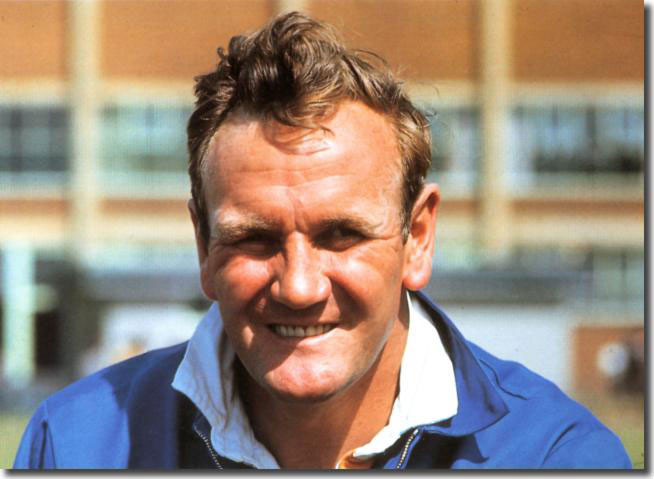 Part
2 Learning the ropes 1927-51 - Part 3 Centre
stage with City 1951-56 - Part 4 Shuffling off
stage 1956-61 - Part 5 On the march with Leeds
United 1961-67 - Part 6 The agony and the ecstasy
1967-74 - Part 7 Inn-gerland! 1974-77 - Part
8 Disgrace and despair 1977-89
Part
2 Learning the ropes 1927-51 - Part 3 Centre
stage with City 1951-56 - Part 4 Shuffling off
stage 1956-61 - Part 5 On the march with Leeds
United 1961-67 - Part 6 The agony and the ecstasy
1967-74 - Part 7 Inn-gerland! 1974-77 - Part
8 Disgrace and despair 1977-89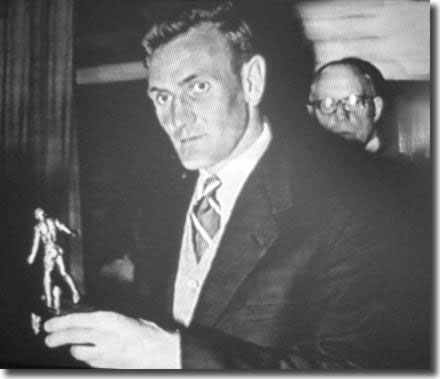 caps
and enjoyed such a limited time at the very top of the game. However,
he won the Footballer of the Year award in 1955, when he took Manchester
City to the verge of the Twentieth Century's first League and Cup double,
and had the most celebrated game of his life a year later when he was
recalled to the City side that won the FA Cup. He enjoyed a pivotal role
as the Revie Plan brought home the bacon.
caps
and enjoyed such a limited time at the very top of the game. However,
he won the Footballer of the Year award in 1955, when he took Manchester
City to the verge of the Twentieth Century's first League and Cup double,
and had the most celebrated game of his life a year later when he was
recalled to the City side that won the FA Cup. He enjoyed a pivotal role
as the Revie Plan brought home the bacon.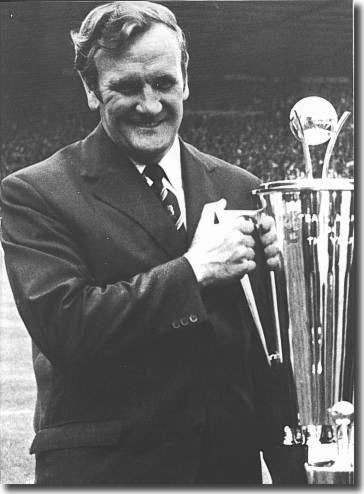 could
have been a lasting dynasty. Liverpool were in a similar state, following
the retirement of Revie's old friend Bill Shankly in 1974, but the Leeds
directors did not follow the Anfield club's example of continuity and
stability. Liverpool appointed Shanks' right hand man Bob Paisley and
went on to even greater success. Leeds ignored Revie's recommendation
of Johnny Giles as his successor, and instead opted controversially for
Brian Clough, one of the club's fiercest critics. The ripples from that
appointment and subsequent sacking struck at the heart of the club's togetherness.
could
have been a lasting dynasty. Liverpool were in a similar state, following
the retirement of Revie's old friend Bill Shankly in 1974, but the Leeds
directors did not follow the Anfield club's example of continuity and
stability. Liverpool appointed Shanks' right hand man Bob Paisley and
went on to even greater success. Leeds ignored Revie's recommendation
of Johnny Giles as his successor, and instead opted controversially for
Brian Clough, one of the club's fiercest critics. The ripples from that
appointment and subsequent sacking struck at the heart of the club's togetherness.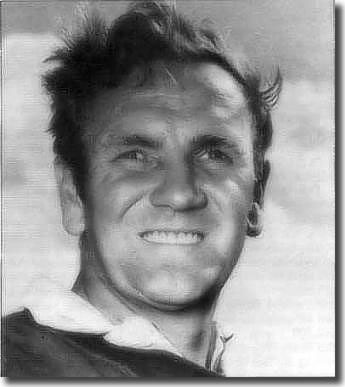 qualities
as a manager in one phrase, it would be attention to detail. He compiled
elaborate dossiers on our opponents, and for an hour or so on the morning
before a match he'd analyse every one of their players - their weaknesses,
their strengths, whether they were quick or slow. Sometimes it got a bit
hard to bear. If someone started nodding off, he'd shout, "Pay attention!
I've spent fortunes sending people all over Europe to watch teams and
bring back reports, so you bloody listen!"'
qualities
as a manager in one phrase, it would be attention to detail. He compiled
elaborate dossiers on our opponents, and for an hour or so on the morning
before a match he'd analyse every one of their players - their weaknesses,
their strengths, whether they were quick or slow. Sometimes it got a bit
hard to bear. If someone started nodding off, he'd shout, "Pay attention!
I've spent fortunes sending people all over Europe to watch teams and
bring back reports, so you bloody listen!"'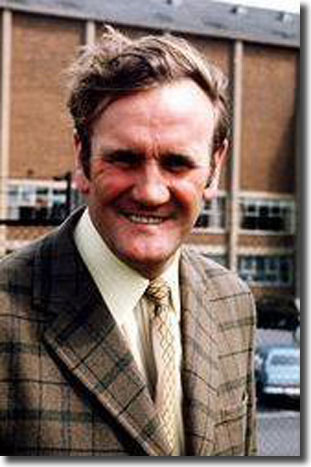 be
allowed in. And he meant it.
be
allowed in. And he meant it.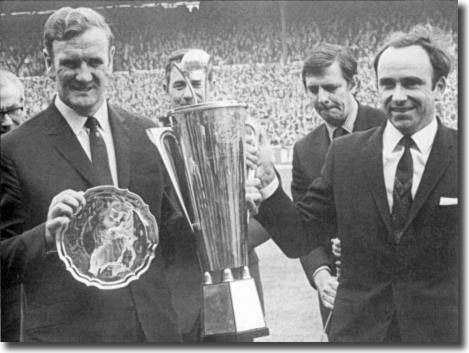 going
to increase your money," and then tell you the amount. I thought:
"I wasn't going to ask for that much ... that's brilliant."
You'd walk out of his office thinking "I've done it" but then
a bit later, you'd suddenly think: "He's done you. He's got you under
contract again, but you think he's a good guy because he's upped your
wages!"'
going
to increase your money," and then tell you the amount. I thought:
"I wasn't going to ask for that much ... that's brilliant."
You'd walk out of his office thinking "I've done it" but then
a bit later, you'd suddenly think: "He's done you. He's got you under
contract again, but you think he's a good guy because he's upped your
wages!"'